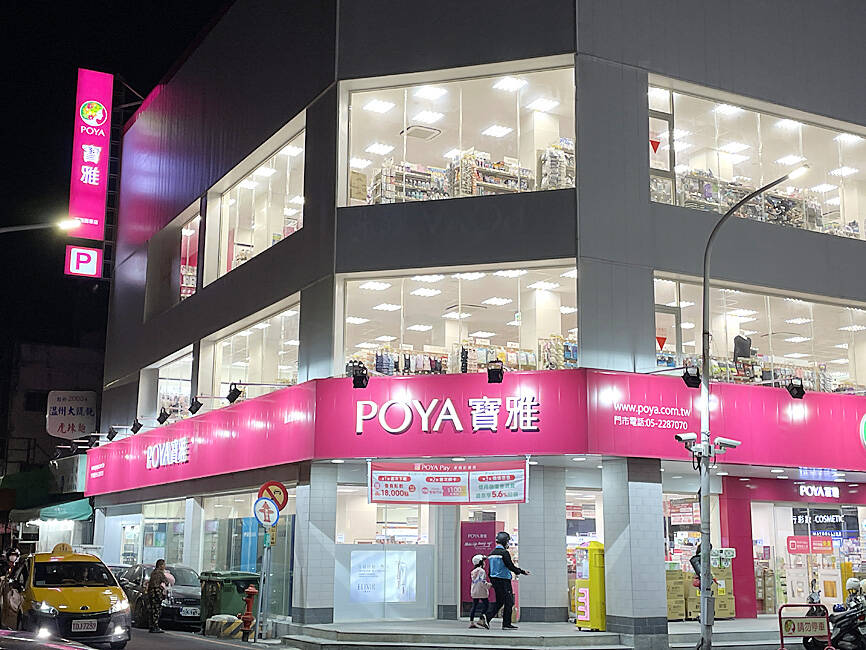Beauty and daily merchandise retailer Poya International Co (寶雅國際) yesterday reported better-than-expected profit for the second quarter, as high-margin cosmetics and efficient cost controls further lifted the firm’s gross margin.
Poya posted NT$589.08 million (US$17.92 million) in net profit for the April-to-June quarter, up 23.98 percent from NT$475.13 million a year earlier.
That translated into earnings per share (EPS) of NT$5.61, up from NT$4.55 the previous year, the company said in a regulatory filing.

Photo: Amy Yang, Taipei Times
Gross margin was also better than expected at 43.87 percent in the second quarter, up 2.48 percentage points from a year earlier, while operating margin rose 1.06 percentage points to 12.35 percent after consolidated sales increased 6.57 percent year-on-year to NT$5.63 billion, company data showed.
Fubon Securities Investment Services Co (富邦投顧) earlier said it had expected Poya to post second-quarter earnings of NT$5.4 per share, gross margin of 43.5 percent and operating margin of 12.4 percent.
In the first half of the year, Poya’s net profit grew 13.9 percent year-on-year to NT$1.29 billion, with EPS of NT$12.31, as revenue increased 8.8 percent to NT$11.5 billion.
Gross margin and operating margin improved to 44.07 percent and 13.73 percent respectively from 43.07 percent and 13.52 percent, company data showed.
“Benefiting from accelerated store expansion and improved beauty store and store-in-store deployments, the company’s same-store sales are expected to maintain positive growth, which would further lift its operating margin and achieve double-digit percentage growth in profit,” Fubon Securities said in a note.
The “store-in-store” concept refers to a separate shopping area within a larger store that features products from a specific brand, with Poya and the brands benefiting from cost and product arrangements.
The retailer is one of the nation’s major distributors of cosmetic and skincare products. As of the end of last month, it operated 380 namesake stores, including 50 “Poya Beauty” flagship stores and 22 “store-in-store” concept shops, as well as 10 Poya Home hardware outlets.
The company launched 15 new stores in the first half of this year and is expected to open another 40 new stores in the second half, aiming to expand its operating scale to more than 400 cosmetics outlets by the end of this year. It hopes a larger operating scale could help it expand total sales and maintain its leading position among Taiwan’s cosmetics distribution channels.

When an apartment comes up for rent in Germany’s big cities, hundreds of prospective tenants often queue down the street to view it, but the acute shortage of affordable housing is getting scant attention ahead of today’s snap general election. “Housing is one of the main problems for people, but nobody talks about it, nobody takes it seriously,” said Andreas Ibel, president of Build Europe, an association representing housing developers. Migration and the sluggish economy top the list of voters’ concerns, but analysts say housing policy fails to break through as returns on investment take time to register, making the

‘SILVER LINING’: Although the news caused TSMC to fall on the local market, an analyst said that as tariffs are not set to go into effect until April, there is still time for negotiations US President Donald Trump on Tuesday said that he would likely impose tariffs on semiconductor, automobile and pharmaceutical imports of about 25 percent, with an announcement coming as soon as April 2 in a move that would represent a dramatic widening of the US leader’s trade war. “I probably will tell you that on April 2, but it’ll be in the neighborhood of 25 percent,” Trump told reporters at his Mar-a-Lago club when asked about his plan for auto tariffs. Asked about similar levies on pharmaceutical drugs and semiconductors, the president said that “it’ll be 25 percent and higher, and it’ll

CHIP BOOM: Revenue for the semiconductor industry is set to reach US$1 trillion by 2032, opening up opportunities for the chip pacakging and testing company, it said ASE Technology Holding Co (日月光投控), the world’s largest provider of outsourced semiconductor assembly and test (OSAT) services, yesterday launched a new advanced manufacturing facility in Penang, Malaysia, aiming to meet growing demand for emerging technologies such as generative artificial intelligence (AI) applications. The US$300 million facility is a critical step in expanding ASE’s global footprint, offering an alternative for customers from the US, Europe, Japan, South Korea and China to assemble and test chips outside of Taiwan amid efforts to diversify supply chains. The plant, the company’s fifth in Malaysia, is part of a strategic expansion plan that would more than triple

Taiwanese artificial intelligence (AI) server makers are expected to make major investments in Texas in May after US President Donald Trump’s first 100 days in office and amid his rising tariff threats, Taiwan Electrical and Electronic Manufacturers’ Association (TEEMA, 台灣電子電機公會) chairman Richard Lee (李詩欽) said yesterday. The association led a delegation of seven AI server manufacturers to Washington, as well as the US states of California, Texas and New Mexico, to discuss land and tax issues, as Taiwanese firms speed up their production plans in the US with many of them seeing Texas as their top option for investment, Lee said. The